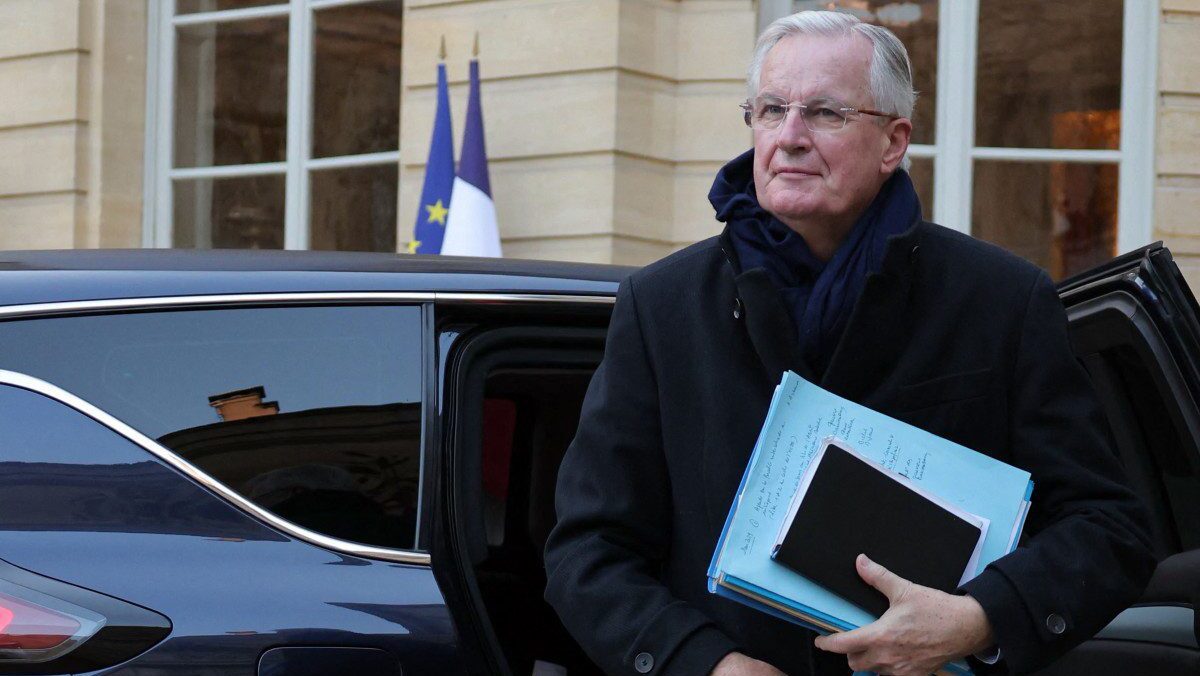
French Prime Minister Michel Barnier arrives to attend a governmental seminar at the Hotel Matignon in Paris, on November 4, 2024.
Photo Thomas SAMSON / AFP
With the deadline for voting on the 2025 budget approaching, the Rassemblement National (RN) is stepping up the pressure on Michel Barnier’s government. As it stands, Marine Le Pen’s party believes it will not vote for the budget, which would put the government at risk of being toppled by a motion of censure. In an attempt to ward off this fate, Barnier met with Marine Le Pen on the morning of November 25th.
Discussions on the French budget for 2025 are dragging on, with no compromise agreement emerging between MPs to secure a majority. In the absence of a majority, Michel Barnier’s government, painstakingly put together in September after months of negotiations, would be reduced to forcing through the budget using article 49.3 of the constitution, which would in turn expose it to a motion of censure, i.e., a vote of hostility leading to its toppling.
Unlike under the previous prime minister Élisabeth Borne, the risk of the government being ousted is high this time, as both the left-wing coalition and the Rassemblement National could choose to vote for a joint motion against Michel Barnier. As the balance of power has changed in the National Assembly since the last elections, the combined votes of the Left and the RN are now enough to bring about the government’s demise.
It is to avoid this catastrophic scenario that Prime Minister Michel Barnier has announced his intention to meet with representatives of the main parties with seats in the National Assembly. He began his consultations by receiving Marine Le Pen at the Hôtel de Matignon, as she heads the largest parliamentary group. Le Pen was accompanied by Jean-Philippe Tanguy, the group’s deputy chairman, who is responsible for economic issues.
Speaking on RTL radio on Wednesday, November 20th, Marine Le Pen said that she and her 123 MPs could vote in favour of the motion of censure that the Left will introduce when the government uses the 49.3 to pass the budget in December:
We will not accept any further cuts to the purchasing power of the French people, that’s a red line. And if, indeed, this red line is crossed, we will vote for censure.
In October, the Left introduced its first motion of censure against Michel Barnier. The RN chose not to vote for it. But relations with the prime minister have deteriorated since then. The threat of a vote of no confidence comes at a time when the leader of the RN MPs is awaiting the verdict in the trial of her party’s European parliamentary assistants, which could result in her being disqualified from standing in the 2027 presidential election. In the context of a highly political trial, the RN has no intention of keeping a low profile and is evoking the power it wields in the assembly.
The RN complains of being totally ignored by the prime minister and his teams. As it stands, the RN accuses the budget of not incorporating any of the party’s proposals. “Between zero and taking on board some of our proposals, there’s quite a margin,” exclaimed RN MP Philippe Ballard on Sunday, November 24th, accusing the budget of failing to include any structural reform measures.
The RN is particularly opposed to the increase in electricity tax, which is expected to take a heavy toll on the budgets of the poorest households. According to rumours reported by France Info, the prime minister is prepared to abandon this measure but does not want to give the impression that he is giving in to the demands of the RN.
Following her meeting with the PM, Marine Le Pen said she was disappointed with the discussions. She felt that Barnier had “stuck to his guns.” If the budget remains as it is, the RN will therefore vote for censure. “My position has not changed. Nor, it seems, has that of the prime minister,” she told reporters.
Marine Le Pen intends to stick to her line and has responded to the insinuations of those who accuse her of wanting to plunge the country into chaos. She condemned “the little tune of saying if this budget is ever rejected, if there is censure, it will be dramatic, it will be chaos, etc.”
If the budget is rejected, she pointed out that last year’s budget will apply—a budget that she considers “rather less bad than this one since there are fewer taxes that will weigh on the working and middle classes.”
Marine Le Pen has announced that she wants to wait for the final vote, in mid-December, before deciding on a possible vote of no confidence.
